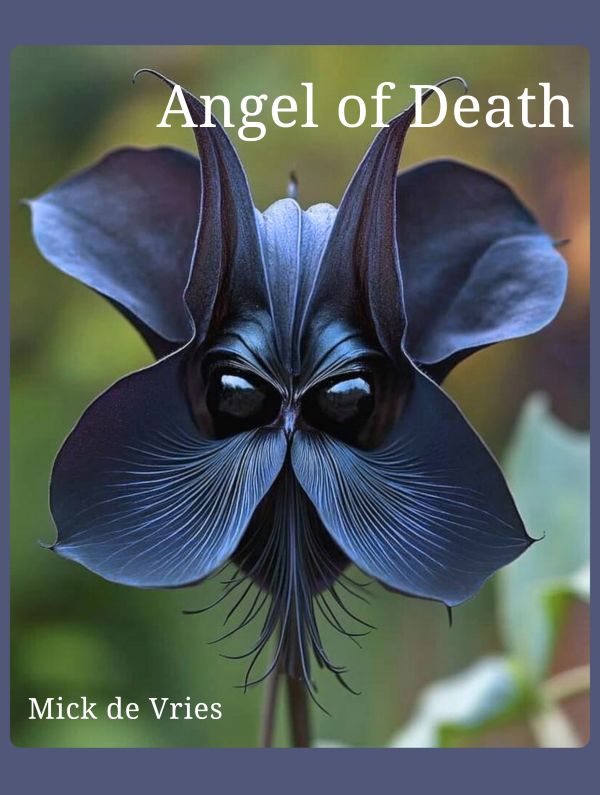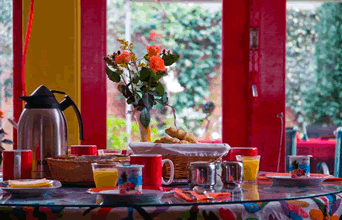Xaviera, while sorting through her library in preparation for her decision to embrace her inevitable death, made a shocking discovery. Among hundreds of books, she discovered a novel written by her father, DR. MICK DE VRIES.
Mick de Vries (1902 - 1973) was a physician, psychiatrist, artist, writer, and lifelong friend of Simon Vestdijk, the famous Dutch author, nominated 15 times for the Nobel Prize in Literature. He and Mick attended medical school in Amsterdam, and both were frequent visitors to the Dutch East Indies during their mutual trips as ship doctors to Indonesia. It was Vestdijk who inspired Mick to add writing to his artistic talents, resulting in the publication of ANGEL OF DEATH in 1940. De Vries and Vestdijk maintained a lively correspondence until Vestdijk died in 1971: Mick's letters have been preserved and published under the title Knetterend Vuurwerk.
ANGEL OF DEATH is largely set in the Dutch East Indies, where de Vries paints a sharp picture of a colonial society. The main character is a woman who, as a nurse, can commit misdeeds without anyone noticing. Fate and the fascination with death play an important role. It is a haunting book emphasizing gloom, violence, loneliness, ugliness, disease, and other dark sides of human existence. The many striking scenes from the darkest period in world history justify the reissue of this chilling novel!
Unknown to de Vries at the time, his descriptions of pre-war tales of polio paralysis, mercy killings, interrogations by incompetent inquisitors, and incarceration under inhumane, filthy conditions were a macabre foreshadowing of what was to befall him and his family only four years later. After my father married my French/German mother, Germaine Schluetter, they settled in the Dutch East Indies, where Mick had been living on and off for the last 15 years and had become the director of the hospital in Surabaya.
 Xaviera was born in 1943 during the Japanese occupation. The family was quickly interned in various camps, and cruelly tortured, and all three barely escaped death. The Japanese assigned Mick as a physician for the women’s camps. Unfortunately, this didn’t prevent him from being tortured nearly to death by the camp officials for providing extra medical treatment for his patients. Xaviera’s mother was also beaten and left for dead for days in an enclosure of rotting corpses by the infamous Japanese beastly commander SONEI in the horrid concentration camp TJIDENG. Her crime was attempting to purchase a bag of sugar on the black market for Xaviera, who had a very high fever and dysentery.
Xaviera was born in 1943 during the Japanese occupation. The family was quickly interned in various camps, and cruelly tortured, and all three barely escaped death. The Japanese assigned Mick as a physician for the women’s camps. Unfortunately, this didn’t prevent him from being tortured nearly to death by the camp officials for providing extra medical treatment for his patients. Xaviera’s mother was also beaten and left for dead for days in an enclosure of rotting corpses by the infamous Japanese beastly commander SONEI in the horrid concentration camp TJIDENG. Her crime was attempting to purchase a bag of sugar on the black market for Xaviera, who had a very high fever and dysentery.
After surviving the war, Mick and his family returned to the Netherlands. In 1973, Dr. Mick de Vries died of heart failure after becoming partially paralyzed from suffering one stroke after another for seven years. Here was the bright lover of books by Dostoevsky and Franz Kafka, now enjoying the silly films of Lucille Ball and Laurel and Hardy!
One asks, could Xaviera’s recent discovery of her father’s novel extolling merciful deaths and exposing the macabre side of human nature be her father’s gift from beyond? Is it his way of supporting and validating her decision to embrace euthanasia as a possible life alternative? One of Xaviera's lifelong psychological issues is her desire to die. She is the spokeswoman for a few organizations that advise about this subject in the Benelux, often speaking about EUTHENASIA and DEATH.
If you wish to order ANGEL OF DEATH please send an email to Xaviera Hollander at
The price is euro 25 per book plus postage.
Website is www.xavierahollander.com/shop







